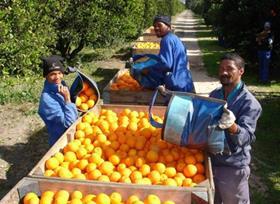
Predicting the final South African citrus export crop so early in the season is asking for trouble.
While it appears that the crop could be down this year, as indicated by adverse climatic conditions in northern parts of the country, the early pundits may well proved to be wrong. That is why Justin Chadwick, chief executive of the South African Citrus Growers’ Association, is reluctant to enter into a forecast just yet.
Last year South African exports to Europe and the UK exceeded all expectations despite the threat of citrus black spot (CBS) interceptions spoiling the party. In fact, it was somewhat embarrassing for industry leaders that the country managed to do so well after they insisted for so long that the tough EU measures introduced in regards to South Africa would make it impossible for them to export to the EU.
In fact, they did not only do extremely well in the EU, but also virtually everywhere else they sold their fruit around the world. Yet, speaking to Chadwick and growers across the industry it is clear that 2016 could be different back on the farm. In the northern areas of the country, first the drought and then violent storms caused major problems. Hail damaged citrus and other crops in the Hoedspruit and Letaba regions and there have been reports of growers having to stop irrigating because of a lack of water. Chadwick says that in certain regions trees have been under stress because of high temperatures and lack of water and that this was bound to have an effect. “On the other hand, the Eastern Cape, where they grow a quarter of the total crop, has had much better growing conditions.”
Last year South Africa exported more than 118 million cartons after initially forecasting a reduced crop earlier in the year, though one must accept that the growing conditions were ideal, which is not likely to be the case this year. While they keep one eye on the orchards and the weather, South African growers are equally interested in what is happening beyond their shores that may affect their season. Along with the state of the local economy and political shenanigans that caused the South African currency to decline further in recent months, the major interest is what is going to happen with the CBS issue in Europe.
While South Africa has been particularly successful in managing the problem, this came at a great cost. South Africans continue to argue that complying with the EU restrictions is costing them a billion rand or more, and that this money will be most useful if deployed back on the farm in new developments and job creation in a country where the economy is in decline.
They also maintain that they are being treated unfairly compared to other countries who also need to comply with EU plant health requirements. Increasingly, the matter seems to be pointing in the direction of a World Trade Organization challenge. If the EU finds itself in a position where it has, as the South Africans and many other international observers think, overplayed its hand and if it has to backtrack, it could be a costly affair. Those who know Brussels and what it is like to deal with, will say that it will be a long while before that fat lady sings. Therefore South Africans must expect much of the same as last year.
With a dry season in South Africa’s summer rainfall regions, many believe that CBS will not be a problem this year. It may be a breathing space for both parties to reassess.



